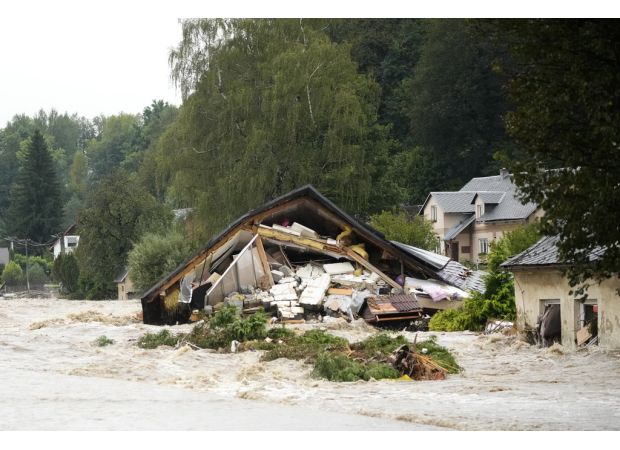Severe weather strikes European country with worse impact than worst flood in history.
Heavy rain in Central Europe leads to widespread evacuations and increasing fatalities.

Central Europe is once again facing the devastating effects of torrential rains, forcing thousands of people to evacuate their homes and causing a rise in the death toll. Several countries, including Austria, the Czech Republic, Poland, and Romania, have already been hit by severe flooding, and there are concerns that Slovakia and Hungary may be next. The culprit behind this disaster is a low pressure system from northern Italy, which has been dumping record amounts of rain in the region since last Thursday.
As of Sunday, the floods had claimed the lives of five people in Romania, one each in Austria and Poland, and four people were reported missing in the Czech Republic after being swept away by the raging waters. The situation is dire, and emergency services are working tirelessly to rescue those in danger and provide aid to those affected by the floods.
The Czech Republic has been hit particularly hard, with authorities declaring the highest flood warnings at over 100 locations across the country. The worst-hit areas are in the north-eastern regions, where the Jeseniky mountains near the Polish border have received the heaviest rainfall in recent days. The city of Opava is one of the most severely affected areas, with up to 10,000 residents being asked to evacuate their homes and seek higher ground. Mayor Tomáš Navrátil has urged people not to wait and to prioritize their safety.
The situation in the Czech Republic is said to be even worse than the devastating floods of 1997. Prime Minister Petr Fiala has stressed the importance of saving lives and has called for a government meeting to assess the damages. However, with the floods still raging through the country, he also warned that the worst may not be behind them yet. President Petr Pavel, on the other hand, has expressed a more optimistic view, stating that the lessons learned from previous disasters are evident in the current relief efforts.
In the neighboring countries, thousands have also been evacuated in the towns of Krnov and Cesky Tesin in Poland, where the Oder River has reached extreme levels. The city of Ostrava, the regional capital, is facing major traffic disruptions, and almost no trains are operating in the region. In the Jeseniky mountains, towns and villages have been inundated and cut off by the raging waters, and the military has been called in to assist with evacuations.
The situation in Austria is no less dire, with the entire state of Lower Austria being declared a disaster zone. Tragically, a firefighter lost his life while trying to pump out a flooded basement in the town of Tulln. The governor of Lower Austria, Johanna Mikl-Leitner, has described the current hours as difficult and dramatic for the people of Lower Austria, and the Chancellor, Karl Nehammer, has promised the full support of 2,400 soldiers in the relief efforts.
In Vienna, the Wien River has overflowed its banks, causing flooding in nearby homes and forcing the first evacuations. Meanwhile, in Romania, another person has died in the eastern county of Galati, adding to the four reported deaths the day before. In Poland, Prime Minister Donald Tusk has described the situation as dramatic, with one person presumed dead in the south-western region and rising waters causing chaos in the town of Glucholazy.
This sudden change in weather, following a hot start to September, has been attributed to human-caused climate change. As scientists have documented, this summer has been the hottest on record, breaking the previous record set just last year. The hotter atmosphere can result in more intense rainfall, and the effects are clearly visible in Central Europe. As the region continues to grapple with the aftermath of this disaster, we must acknowledge the role of climate change and work towards preventing further devastation in the future.
7 Views


